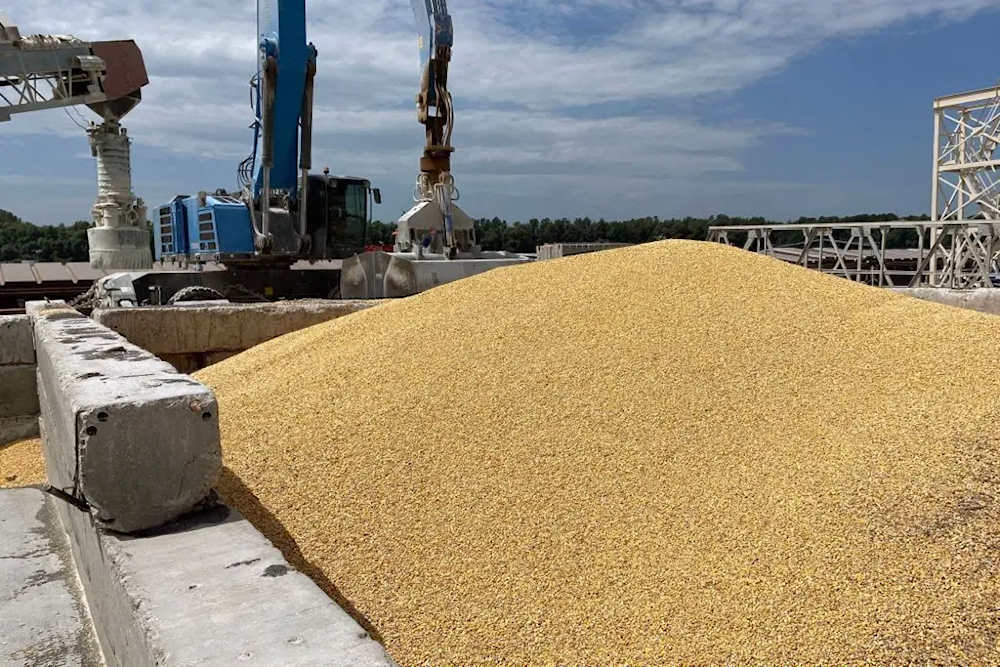EU to impose higher tariffs on Ukrainian agricultural goods in June
The EU will raise tariffs on Ukrainian maize, sugar, honey, and poultry starting June 6, amid trade tensions and negotiations over a new agreement.
-

A pile of maize grains is seen on the pier at the Izmail Sea Port, Odesa Oblast, Ukraine on July 22, 2023. Illustrative purposes only. (Stringer/ AFP)
The European Union is set to impose significantly higher tariffs on a range of Ukrainian agricultural products, including maize, sugar, honey, and poultry, starting June 6, according to a report by The Financial Times. The move signals a sharp shift in trade relations between Brussels and Kiev, as the EU steps back from previous tariff-free arrangements granted after the start of the war in Ukraine.
Previously, these goods had entered the EU without duties under special trade preferences aimed at supporting Ukraine’s economy. However, citing unnamed sources, The Financial Times reports that the European Commission now plans to replace the current framework with “transitional measures” that will reintroduce tariff restrictions and substantially raise duties on previously exempt products.
As part of the proposed shift, the European Commission is in the process of negotiating a new Ukraine-EU trade agreement. Two EU diplomats told The Financial Times that the plan involves dividing the annual duty-free quota into twelve monthly segments. This mechanism is designed to limit surges in Ukrainian imports while allowing Brussels and Kiev time to finalize a longer-term trade arrangement.
These EU-Ukraine tariff changes are expected to reduce the volume of Ukrainian agricultural products entering European markets, particularly maize and poultry, which have drawn criticism from farming sectors in several member states. While framed as a technical step, the policy change reflects growing pressures within the bloc over the effects of Ukrainian imports on local economies.
Poland’s role in ending Ukraine’s trade preferences
Tensions around Ukrainian exports have grown more pronounced due to Poland’s role in the EU-Ukraine trade dispute. Holding the rotating presidency of the EU Council since January 1, 2025, Warsaw has taken a firm stance against extending trade preferences beyond their current expiration.
During an address at the EU-Ukraine Business Forum in Brussels on April 10, Polish European Union Affairs Minister Adam Szlapka announced that the bloc had finalized its decision not to renew trade preferences after June 5. This marked a definitive political shift and aligned with longstanding concerns from Polish farmers about the impact of low-cost Ukrainian goods on domestic markets.
With the upcoming changes, Brussels aims to balance continued support for Ukraine with internal economic concerns, a task that becomes increasingly complex as the war drags on and political dynamics within the EU evolve.
EU's evolving trade stance with Ukraine
In March 2024, the European Union extended its suspension of import duties and quotas on Ukrainian agricultural exports, a measure initially implemented in 2022 to support Ukraine amid the ongoing conflict. However, to address concerns from EU farmers about market disruptions, the EU introduced safeguard provisions.
Despite these safeguards, several EU member states, including Poland and Hungary, have taken unilateral actions to protect their domestic agricultural sectors. Hungary, for instance, announced additional restrictions on Ukrainian agricultural imports, citing the need to shield its farmers from market fluctuations caused by cheaper Ukrainian products. These developments underscore the growing tensions within the EU regarding the balance between supporting Ukraine and protecting the interests of local farmers.

 3 Min Read
3 Min Read










